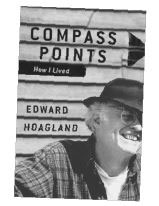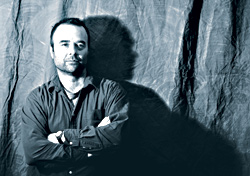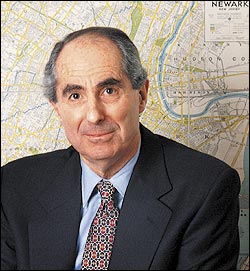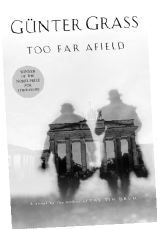IN THE NEARLY 50 years since he published his first novel, Cat Man, Edward Hoagland has loped across far-flung countries (Sudan, Antarctica, India) and wandered through the sideshows of our nation (boxing rings, circuses, bayou trapping expeditions). As a stylist, he’s carved a graceful Whitmanian niche among today’s turgid specialists and tepid wordsmiths. Before Annie Dillard or Barry Lopez trekked across America to rediscover our tangled bounty, Hoagland was there, taking notes, limning our landscape with a soulful clarity. In Compass Points, his luminous memoir, Hoagland turns the klieg lights of his formidable prose on his own life, telling the story of how a boy from New Canaan, Conn., eschewed his place in WASP society and became one of our most talented writers on the natural world.
Compass Points
by Edward Hoagland (Pantheon, $25)
Constructed from 11 vignettes that occasionally overlap, Hoagland’s book is not a memoir in the conventional sense but more a riff on the basic themes of his life: family, literary ambition, and travel. Born in Manhattan to a socially aspiring Wall Street attorney and the daughter of a logging family, Hoagland followed the expected path, attending Deerfield Academy and then Harvard, diverging from the three “accepted” vocations—law, medicine, and the cloth—when as a college senior, he sold Cat Man to Houghton Mifflin. Hoagland drew on the summers he spent crisscrossing the country with the circus. In this more generous era, recently returned soldiers and working-class stiffs would give rides to hitch- hikers, strike up conversations, and share their hardscrabble wisdom.
Hoagland’s wanderlust grew as he aged, and so he bounced from New York to California to Europe and back again, always chronicling the fluctuating social tides of America. Compass Points brims with vivid visions of crossing the Brooklyn Bridge at dawn or entering British Columbia on foot. A die-hard sports fan, he would attend Yankee games and then walk the 180 blocks to his East Village apartment, thrumming on the city’s contagious energy. Writers, he says, “serve an apprenticeship in shoe leather.” Wherever he went, it seems, Hoagland made friends, interviewing frontier bachelors and cagey war veterans, gleaning a deep sense of the American vernacular.
Not surprisingly, while Hoagland’s writing flourished, his relationships did not. His first marriage ended abruptly, and his second floundered on the rocks of infidelity. Hoagland glosses over these events circumspectly, the only place where he holds back. Still, even if Compass Points can be viewed as a ragged weave spun from a life of words, it rings with Hoagland’s barbaric yawp, his enduring enthusiasm for the American continent and the dreams it has inspired. In the end, Hoagland’s work and life have melded into a singular, expansive celebration of our country, one that would make Whitman proud.








